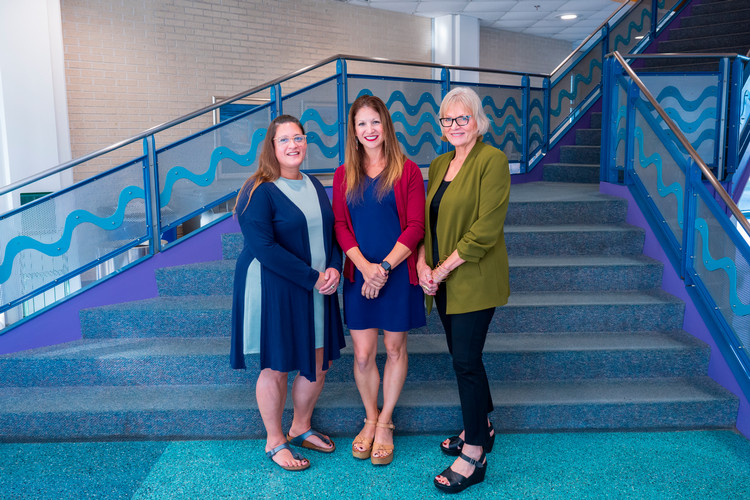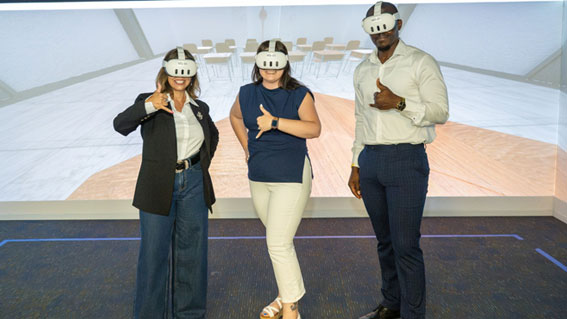TAMU-CC Receives $1.15 Million NSF Award to Help Train STEM Teachers
CORPUS CHRISTI, Texas – Texas A&M University-Corpus Christi has been awarded a $1.15 million National Science Foundation grant to recruit 24 students and help prepare them to become middle school and high school teachers in the fields of science, technology, engineering, and math, known as STEM.
The project, “Collaborative Research: Community-Engaged Preparation of Highly Skilled, Equity-focused Secondary STEM Teachers,” is being led by Principal Investigator Professor Cherie McCollough, chair of the Department of Life Sciences in the College of Science and Engineering. Her co-principal investigators are Professor and Director of Clinical Experiences and School and University Partnership Field Experiences Carmen Tejada-Delgado, Professor Cilla “Faye” Bruun, and Assistant Professor Robin Johnson, all of the College of Education and Human Development.
“The proposal was a result of much work and amazing collaboration among the PIs over a four-year period,” McCollough said. This project will serve the national need of preparing highly skilled STEM teachers for high-need school districts. The project includes a partnership with Del Mar College, Texas A&M-Corpus Christi, and the West Oso Independent School District. It is part of the NSF’s Robert Noyce STEM INSPIRES (Infusing Social Programs in Residential Education Scholars) project, a working title initiated by the PIs.
“The four PIs on this grant spent four years collecting ideas, reading, traveling to hear about other programs, and in professional development to learn as much as we could about issues related to equity and social justice in our schools,” McCollough said. Their work was initiated after McCollough happened to sit in on a presentation at a conference.
“I was absolutely mesmerized by the speakers and their work – social justice training for elementary teachers prior to entering their classrooms,” McCollough said. She and her A&M-Corpus Christi colleagues learned as much as they could about the approach, met every week, and discussed how they could use these ideas in a secondary teaching program, something that had not been done prior to this project.
They eventually received $75,000 from NSF to plan their larger proposal, and after many iterations with much work from the four PIs, the proposal was submitted and resulted in the grant being funded.
The project will recruit 24 highly qualified, diverse biology, chemistry, marine and life sciences, mathematics, and physics majors and support them to become culturally competent critical thinkers and effective STEM educators, McCollough said. It will support these Robert Noyce Teacher Scholars as they complete STEM degrees and gain secondary teaching certification.
“At the heart of this partnership is a decade-long mutual commitment to develop and retain culturally competent, day-one-ready secondary STEM educators through a strong community-engaged teacher preparation program,” McCollough said. “The project seeks to ensure that Noyce Scholars will know and understand the students they will teach. To this end, the project will engage community mentors to share local knowledge and cultural awareness with the Noyce Scholars.”
A social justice piece will highlight children’s experiences in the social, political, and cultural landscape, providing authentic, intentional cultural experiences beyond the classroom, McCollough said.
In addition, the project incorporates service-learning and self-efficacy-building experiences, with an emphasis on relationship-building with a diverse community. Each of the PIs will contribute both STEM content and a social justice context using culturally relevant teaching strategies.
“The overall goal is to prepare equity-focused teachers who will use culturally relevant, highly effective teaching strategies that increase student learning, success, and a sense of confidence in STEM,” McCollough said.
McCollough said the project will also address declines in the numbers of college students in STEM programs, particularly those who want to become STEM teachers.
The project, which is expected to run through 2026, will create a model that can be replicated at other institutions with similar resources and challenges. Outcomes from this project will be shared through presentations and scholarly publications.










